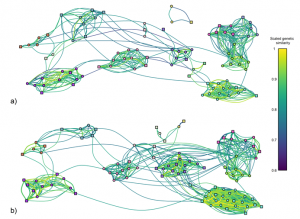We are looking back on some of our MSc graduates who have excelled in scientific research, ecology and conservation around the world since studying with us.
Today we meet Julian who graduated from MSc Evolutionary & Behavioural Ecology in 2011 and is now a Post-doctoral Research Fellow at the University of Zurich.

Julian, it’s been 10 years since you studied with us, why don’t you tell us a bit about what you are working on currently and how you got there?
This is my second postdoc after graduating from my PhD. My first postdoc was in Canada, which seemed a suitably faraway place after being in Cornwall for quite a while and allowed me to pursue my interest in researching animal social systems. I then moved here to Switzerland, where I’ve been working as part of a long-term study, using social network analysis to examine various aspects of animal social behaviour.
How do you think the MSc helped to prepare you for your career?
During my undergrad, the lecturers and field trips convinced me I wanted to pursue a career in research. My MSc at the University of Exeter gave me the skills I needed to do a PhD. When offered the opportunity to carry out a project that hit many of my research interests in Cornwall I jumped at it. The skills I gained over the course of my MSc and PhD have helped me with all my subsequent work … how to ask and answer scientific research, how to plan and carry out experiments in the field and lab alongside scientific writing and statistical analyses.

We’re glad the MSc has helped you achieve your goals. What did you enjoy most about studying in Penryn?
Cornwall was a fantastic place to be, with easy access to the ocean and a great atmosphere. I would struggle to think of other places that combine such a location with such a vibrant research community.
Why did you choose your career path, and do you have any advice for those looking to pursue something similar?
Fieldtrips and lectures during my Undergraduate degree were primarily responsible for me wanting to pursue a research career. I very much enjoy the problem-solving aspect of my work and had a desire to continue this as a career.
My advice would be – finding a topic you are very interested in and enthusiastic about during your undergrad is very useful, but don’t feel you have to decide exactly what you’re going to work on for the rest of your life immediately.

Thanks Julian!
If you want to read more profiles from MSc Evolutionary & Behavioural Ecology graduates follow this link or explore our Graduate in Focus homepage to learn more about the degree programmes we have on offer!

